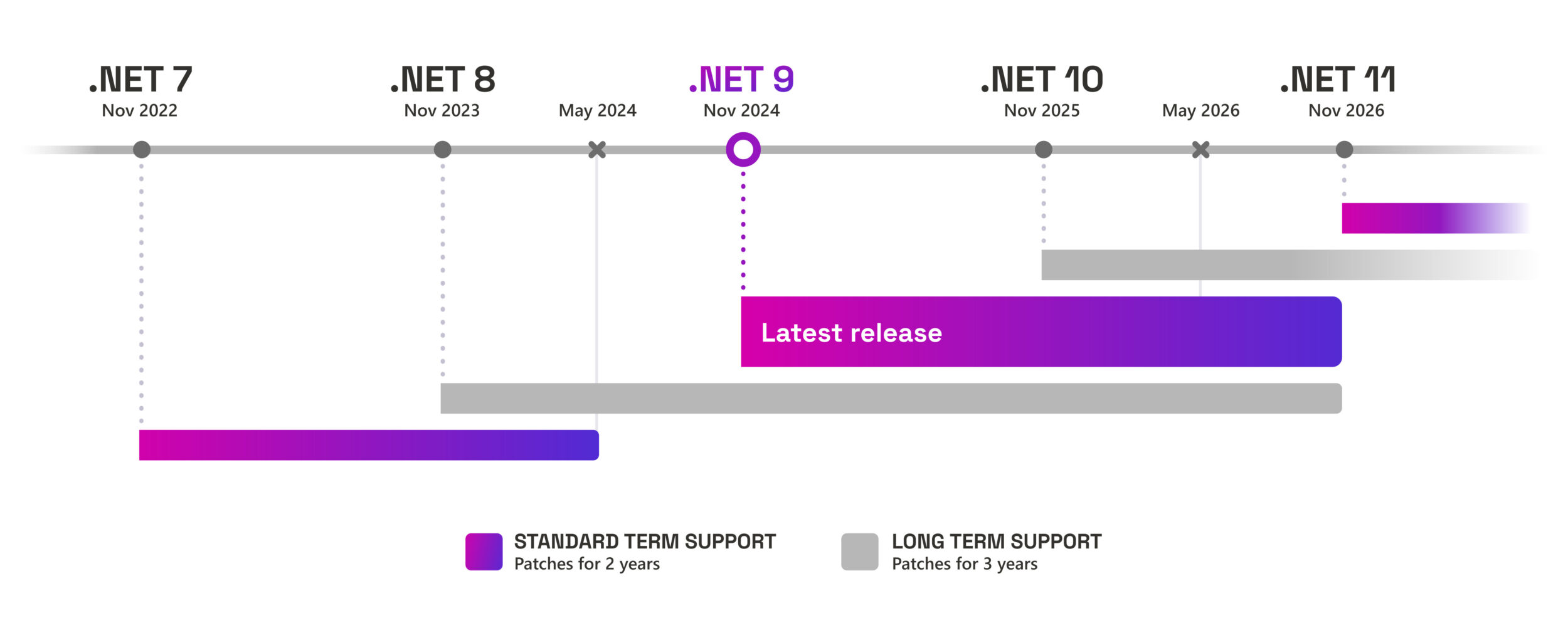We are increasing the length of support offered for .NET Standard Term Support (STS) releases from 18 months to 24 months. This change is effective starting with .NET 9, which means .NET 9 will now reach end of support on November 10, 2026. There is no change for Long Term Support (LTS) releases, which will continue to be supported for three years, and this also doesn’t change support for components or out-of-band releases with their own already established support policies. More information including the end of support dates for all versions of .NET can be found on the .NET support lifecycle policy site.
How .NET support worked previously
.NET ships a new major release every year in November for a consistent, repeatable roadmap. Even-numbered releases are Long Term Support (LTS) releases and get support, including updates, for three years, or 12 months after the next successor release ships. For example, since .NET 10 will ship on November 11, 2025, .NET 8 is scheduled to reach end of support 12 months later, on November 10, 2026. This has not changed.
| Version | Original release date | Latest patch version | Patch release date | Release type | Support phase | End of support |
|---|---|---|---|---|---|---|
| .NET 8 | November 14, 2023 | 8.0.20 | September 9, 2025 | LTS | Active | November 10, 2026 |
Odd-numbered releases are STS releases and were supported, including updates, for 18 months, 6 months after the next successor release shipped. For example, since .NET 10 will ship on November 11, 2025, .NET 9 was scheduled to reach end of support on May 12, 2026.
| Version | Original release date | Latest patch version | Patch release date | Release type | Support phase | End of support |
|---|---|---|---|---|---|---|
| .NET 9 | November 12, 2024 | 9.0.9 | September 9, 2025 | STS | Active | May 12, 2026 |
STS releases will be supported for 24 months, 12 months from when the successor release ships. This means that .NET 8 and .NET 9 will reach end of support on the same day – November 10, 2026.
Why make this change?
We know some customers choose to stay on LTS versions due to the longer support timeframe available for these releases. Some enterprises even have internal policies requiring development teams only use LTS versions.
At the same time, .NET is evolving fast. We ship more features as out-of-band (OOB) releases on a regular basis where we previously might have waited for the next annual release train. .NET Aspire, Microsoft.Extensions.AI, and the C# Dev Kit are examples of OOB releases that regularly ship new features.
From the previous example you can see that .NET 9 which shipped a year after .NET 8 will reach end of support 6 months before .NET 8 reaches end of support. This can be a problem in some cases.
Sometimes, an OOB release includes a dependency on an updated version of a package that ships in the annual release train. If you have made the choice to stay on LTS releases exclusively and then install one of these OOB releases that will move the LTS package version to a newer STS version this can cause problems. Since the package now belongs to an STS release, you have inadvertently moved part of the runtime from LTS to STS and will receive support and updates per the STS lifecycle for that package. As in the .NET 9 example, this support could end sooner as compared to if you had stayed on .NET 8.
Alternatively, you may discover this problem and choose not to use the OOB release to avoid this problem, which means you’ll miss out on the functionality in the OOB. The STS package version dependency is now an adoption blocker for the OOB.
To solve this problem, we’re making a change to the STS support lifecycle – STS releases will be supported for 24 months, 12 months from when the successor release ships, which means that .NET 8 and .NET 9 will reach end of support on the same day – November 10, 2026.
| Version | Original Release Date | Latest Patch Version | Patch Release Date | Release Type | Support Phase | End of Support |
|---|---|---|---|---|---|---|
| .NET 9 | November 12, 2024 | 9.0.9 | September 9, 2025 | STS | Active | November 10, 2026 |

Now, if an OOB release pulls in a newer package version from LTS (.NET 8) to STS (.NET 9), you’ll still be supported through the same date you’d have had if you stayed on the LTS version. Even if you weren’t using any OOB releases, we expect having a longer support window for STS releases will make it easier to consider STS releases for your needs in the future.
Closing
We think you will like this change. That said, if you’re planning on upgrading from .NET 9 to .NET 10 soon, you should continue with your upgrade plans since .NET 10 brings a lot of new capabilities and better performance.
The post .NET STS releases supported for 24 months appeared first on .NET Blog.